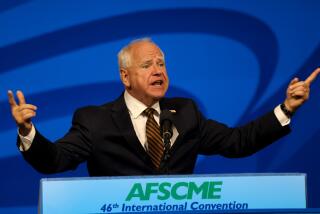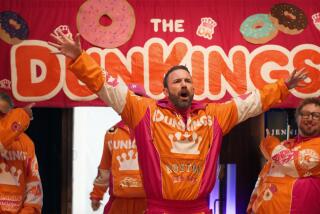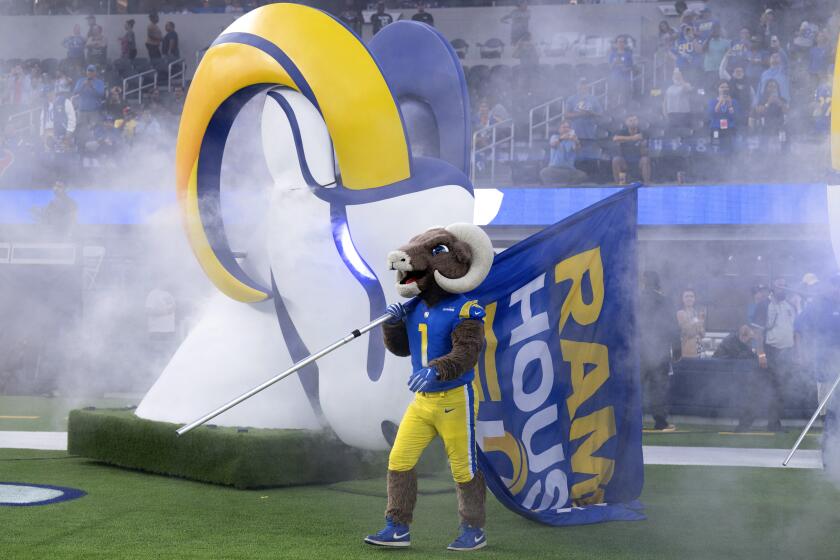With Elway, They Have Outside Shot at Upset
Switching one day to the field of letters, comedian Dick Martin authored the American masterpiece, titled, “With a Daiquiri and a Beautiful Girl, a Guy Can Get Romantic in Cleveland.”
You reflect on this today since those in Cleveland have ample time for romance, removed as they are from the tournament to settle the football championship of earth.
And who was chiefly responsible for removing them? A cad from Stanford named John Elway.
It used to be that guys went to Stanford to marry for position, winding up senior partner in their father-in-law’s brokerage house.
But this Elway goes into business for himself, a specialist in the science of scrambling.
“If you want to scramble, you bum, why don’t you find work as a fry cook?” comes the cry from the Cleveland Dawg Pound.
The Dawg Pound is an area in Cleveland Stadium where inhabitants throw dog biscuits at visiting players, who are sorry to see the throwers give up their lunch.
But Elway brings to Cleveland immense sadness, especially to the Cleveland coach, Bud Carson, whose wounds have yet to heal.
“How can San Francisco put a handle on this guy?” Carson is asked, with reference to the Super Bowl matching the 49ers with Denver.
“You wouldn’t know it but we had a plan to contain him,” he answers glumly. “We were going to prevent him from getting outside. We were going to hit him as frequently as possible. And we were going to play possession football, keeping the ball out of his hands.”
“What worked?” Bud is asked.
“We went zero for three. He got outside. We didn’t hit him. And we didn’t keep the ball. It wasn’t one of our better days, but the plan we developed going in is the basic way to stop Elway.”
Among clubs facing this unique performer, the fear of his slipping outside the rush is uppermost.
“Once he gets loose, there is no way to deal with Denver, no way for your defenders to figure what’s coming,” Carson explains. “Elway himself doesn’t know what’s going to happen. He starts running and looking until he sees something. And he has the kind of arm that can get the ball to what he sees. In the defense, meantime, there is total breakdown.”
Like most coaches, Carson prefers a tidy game, one in which the attack comes at you in an orderly way. But once Elway gets around the rush and starts running, he terrorizes the opposing sideline, aware that its defenders are neutralized, reduced to guessing.
“Do rushers have instructions on how to keep him in the pocket?” you ask Carson.
“Studying Elway’s habits, you find that a rusher reaching for him has a better chance nailing him by grabbing at the back of his shoulder, not the front,” he answers. “You grab at the front and he spins out and slips outside. You are not dealing with a frail creature. This is a very strong man who weighs 215.”
Asked to deal at least twice a season with Elway, the Raiders embrace the old Joe Namath theory on the relativity of sacks.
Sacks make good viewing, Joe always contended. They are pulled off in the open, fully on camera. But, tactically, they are secondary to the simple, less dramatic hit, more frequently applied.
A quarterback needn’t be sacked to reduce him as a weapon. The cumulative effect of legal hits that aren’t necessarily sacks begins to tell as the game progresses.
“The brain keeps count,” Namath used to say.
The Raiders always attempt to slow down Elway with this stratagem, and it was Cleveland’s aim last Sunday.
“We ‘dogged him all day,” Carson says. “We not only didn’t hit him, but got burned on passes to undefended receivers.”
In the Super Bowl, Carson sees a quarterback match of broadly different breeds.
“For the most part, Joe Montana is a very orderly worker,” he says. “He runs a traditional possession attack. A lot of short passes, blended with runs. The other guy runs a crapshoot, as unorthodox as any quarterback you ever will see.”
That the Super Bowl is played on neutral grounds is, in Carson’s judgment, a major asset to a championship event.
But he would favor conference championships on neutral fields, too.
“If Denver had come to Cleveland last Sunday, it would have experienced the same disadvantage we did in Denver,” he says. “When you can’t hear, you can’t play your game. Conference championships are very important. You would have fairer games on neutral fields.”
One of these days, a rich owner whose forces are in the Super Bowl is going to buy up, at scalpers’ rates, 50,000 or so tickets and disperse them to his team’s fans, creating enough crowd noise to be a factor.
Blowing $25 million, he will shrug, reminding you of the words of Nelson Bunker Hunt as the banks were closing in: “A billion isn’t what it used to be.”
More to Read
Go beyond the scoreboard
Get the latest on L.A.'s teams in the daily Sports Report newsletter.
You may occasionally receive promotional content from the Los Angeles Times.










